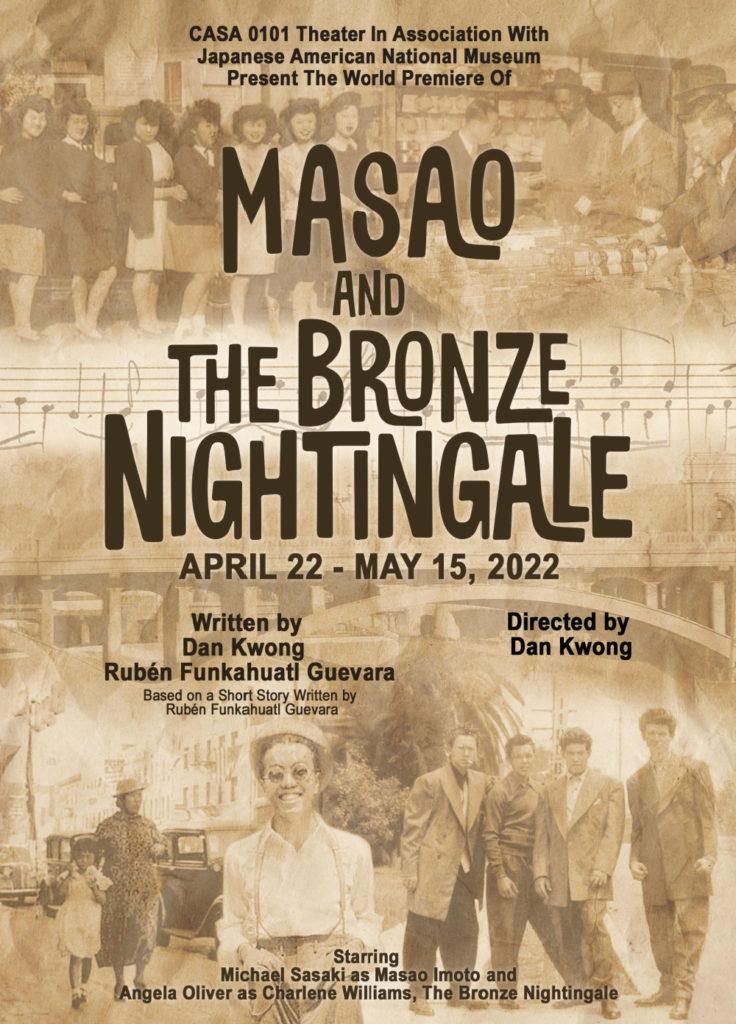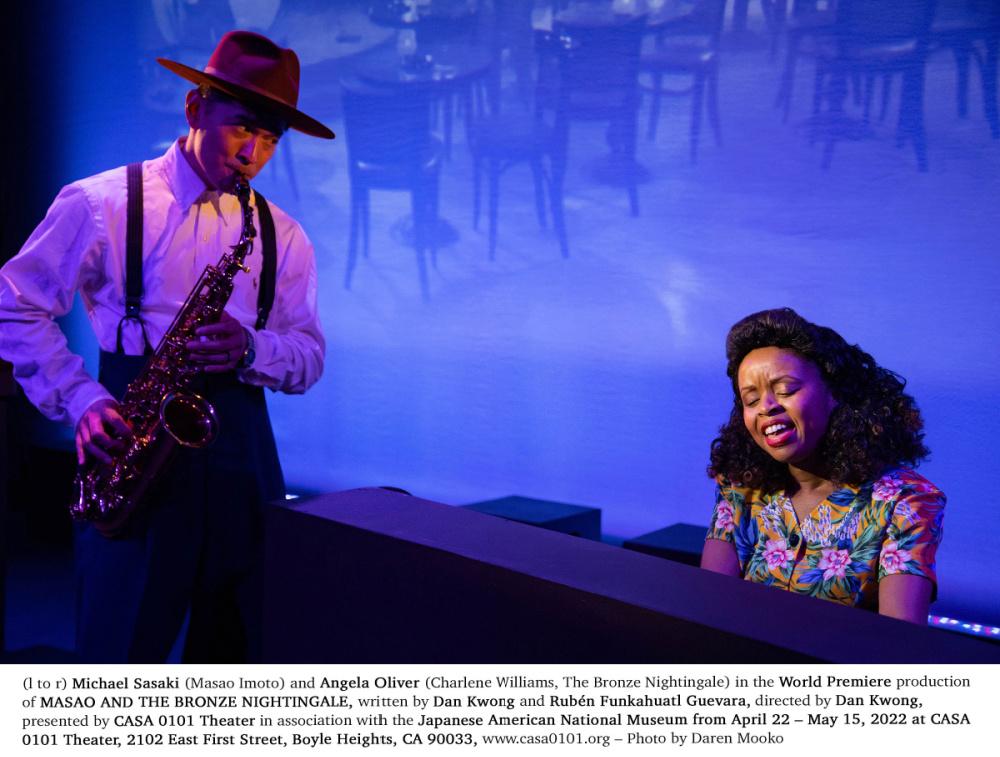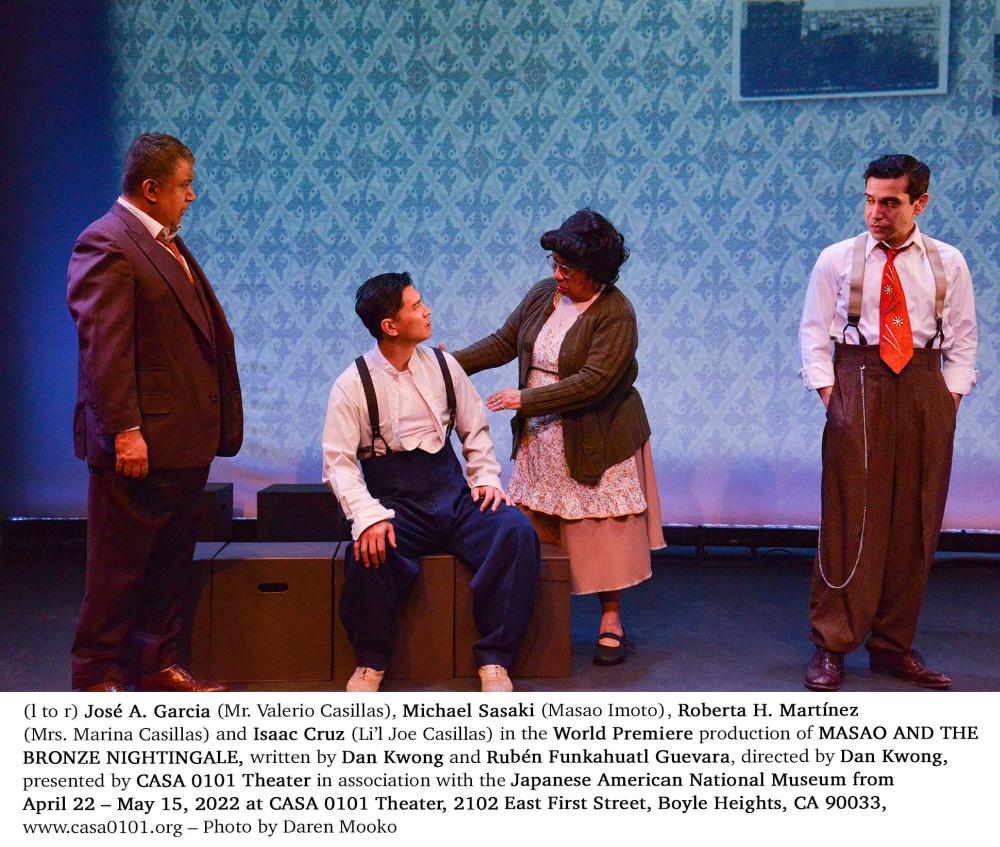The Japanese American internment during WWII was a shameful moment in U.S. history but little has been told about their reintroduction back into everyday life after release from the camps. This aspect of history was poignantly captured in the play Masao and the Bronze Nightingale was presented at CASA 0101 Theater in Boyle Heights.

The show was produced by executive producers Barry Shabaka Henley, Paulina Sahagun, Emmanuel Deleage, and Egypt 2020 in collaboration with the Japanese American National Museum in Little Tokyo. It was written by Dan Kwong and Ruben Funkahuatl Guevara and directed by Dan Kwong. Performances with take place through May 15, 2022.
During the internment, Japanese Americans lost their homes and businesses. Little Tokyo, which had been the heart of the Japanese community for 50 years, was briefly turned into Bronzeville when African Americans from the deep South came west looking for work during the war. Jazz and blues nightclubs flourished featuring rising stars of the day such as T-Bone Walker, Miles Davis, and Charlie “Bird” Parker.

By 1950, Little Tokyo was restored back to the way it was before the war because apartment owners preferred Japanese tenant’s over Black people. Japanese Americans suffered in the interim as many had lost their homes, jobs, and possessions.
Masao and the Bronze Nightingale revolves around the Japanese American Imoto family, who come back to Boyle Heights near Little Tokyo after their internment. While they were gone, their friends, the Casillas family took care of their home collecting rent from tenants.

The Imoto’s son Masao is a sax player who played in a Chicano band with his friend Li’l Joe Casillas before the war and they grew up together in Boyle Heights. During his internment, Masao discovered he loved jazz music which neither Li’l Joe nor his parents understand.
Masao meets an African American chanteuse Charlene in a nightclub in Little Tokyo who is singing Billy Holliday songs with Miles Davis and Charlie Parker. They strike up a relationship and she asks him to play sax in the club when Parker gets too high to perform. Masao’s parents find out about the relationship from Masao’s schoolmate Junko who sees them kissing. His father horrified that he is dating a Black woman, disowns him and kicks him out of the house.
He gets a room at the Miyako hotel, now called the Civic after Little Tokyo’s transition to Bronzeville but goes on a drinking spree which upsets Charlene. She decides to go on tour with Miles Davis leaving Misao without a job.
His drinking and depression almost cause him to jump off the 6th Street bridge, but Valerio Casillas, Li’l Joe’s father, sees what he is doing, talks him down, and takes him in.
Meanwhile, Masao’s mother has a bad asthma attack, which affected many internment camp internees. It brings reconciliation between Masao and his father.
This period of Los Angeles history also includes the Zoot Suit Riots of June 1943. Although the play does not mention that specifically, both Li’l Joe and Masao wear zoot suits made by Valerio Casillas who is a tailor. The costumes in the play designed by Abel Alvarado are impressive and accurate to the period.
Another character in the play is a Jewish music store proprietor Bill Philips portrayed by actor Scott Golden. Philips was an actual Boyle Heights resident who gave free music lessons and the use of musical instruments to working-class schoolchildren.
Boyle Heights was the location of LA’s oldest Jewish community during the early 20th century and was the home of Canter’s Deli from 1931- to 1948 before it moved to the Fairfax District. The play paints a picture of the rich cultural diversity of the neighborhood during the 40s which included Chicano, Jewish, Japanese Americans, and African Americans.
The performances in Masao and the Bronze Nightingale are believable and professional. Occasionally the dialogue is a little hard to hear as some actors were not projecting enough but overall it was fine.
Michael Masuru Sasaki who plays Masao has several emotional and drunken scenes. He grimly depicts the suffering that Japanese Americans endured after coming back from the camps. Greg Watanabe as Masao’s strict father embodies the stoic iciness of an older man trying to hold on to tradition.
As Masao’s boyhood friend, Isaac Cruz as Li’l Joe demonstrates the misunderstanding that can occur when a person returns after suffering a traumatic experience as a person who has no idea what it was like.
Jose A. Garcia as Valerio Casillas and Roberta H. Martinez as Mrs. Casillas provide comic relief and evoke compassion as neighbors who take care of their friends during tough times.
As nightclub vocalist Charlene, Angela Oliver delivers worthy soulfulness in her songs and clearly exemplifies the challenges she deals with as a Black woman of that period trying to find her unique voice. Sachiyo K as Mrs. Imoto delicately captures the essence of a traditional Japanese wife, while Pauline Yasuda as the younger Junko conveys the sass of the younger generation.
For more information about the Japanese American internment during WWII, you may also want to visit the Japanese American National Museum in Little Tokyo.
CASA 0101 Theater 2102 1st Street, Los Angeles, California 90033 – 323.263.7684 info@casa0101.org – Find out what is currently playing here.


Leave a Reply